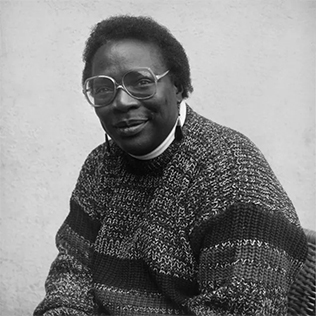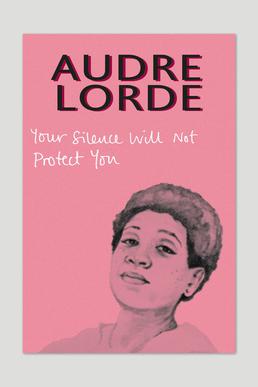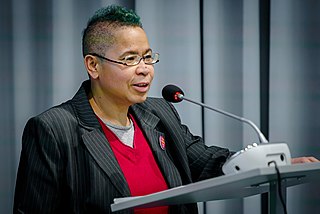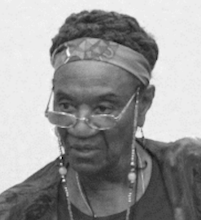Related Research Articles

Audre Lorde was an American writer, professor, philosopher, intersectional feminist, poet and civil rights activist. She was a self-described "Black, lesbian, feminist, socialist, mother, warrior, poet" who dedicated her life and talents to confronting different forms of injustice, as she believed there could be "no hierarchy of oppressions" among "those who share the goals of liberation and a workable future for our children."

Brothers Keepers is a German-based transnational anti-racism project, bringing together hip hop, reggae and soul musicians, headed primarily by Afro-Germans. Their debut single, "Adriano-Letzte Warnung", was written in response to the murder of Alberto Adriano by Neo-Nazis. It remains their most popular release, with more than 6 million views on YouTube.
Postcolonial feminism is a form of feminism that developed as a response to feminism focusing solely on the experiences of women in Western cultures and former colonies. Postcolonial feminism seeks to account for the way that racism and the long-lasting political, economic, and cultural effects of colonialism affect non-white, non-Western women in the postcolonial world. Postcolonial feminism originated in the 1980s as a critique of feminist theorists in developed countries pointing out the universalizing tendencies of mainstream feminist ideas and argues that women living in non-Western countries are misrepresented.
Black feminism is a branch of feminism that focuses on the African-American woman's experiences and recognizes the intersectionality of racism and sexism. Black feminism philosophy centers on the idea that "Black women are inherently valuable, that liberation is a necessity not as an adjunct to somebody else's but because of our need as human persons for autonomy."

Afro-Germans or Black Germans are Germans of Sub-Saharan African descent.
Black is beautiful is a cultural movement that was started in the United States in the 1960s by African Americans. It later spread beyond the United States, most prominently in the writings of the Black Consciousness Movement of Steve Biko in South Africa. Black is beautiful got its roots from the Négritude movement of the 1930s. Negritude argued for the importance of a Pan-African racial identity among people of African descent worldwide.

May Ayim is the pen name of May Opitz ; she was an Afro-German poet, educator, and activist. The child of a German dancer and Ghanaian medical student, she lived with a white German foster family when young. After reconnecting with her father and his family in Ghana, in 1992 she took his surname for a pen name.

The Cancer Journals is a 1980 book of non-fiction by Audre Lorde. It deals with her struggle with breast cancer.

Pat Parker was an African American poet and activist. Both her poetry and her activism drew from her experiences as a Black lesbian feminist. Her poetry spoke about her tough childhood growing up in poverty, dealing with sexual assault, and the murder of a sister. At eighteen, Parker was in an abusive relationship and had a miscarriage after being pushed down a flight of stairs. After two divorces, she came out as a lesbian, "embracing her sexuality" and said she was liberated and "knew no limits when it came to expressing the innermost parts of herself".
Cathy J. Cohen is an American political scientist, author, feminist, and social activist, whose work has focused on the African-American experience in politics from a perspective which is underlined by intersectionality. She is currently the David and Mary Winton Green Professor in Political Science and the College at the University of Chicago, and is the former Director of the Center for the Study of Race (2002–05).

Showing Our Colors: Afro-German Women Speak Out is an English translation of the German book Farbe bekennen edited by author May Ayim, Katharina Oguntoye, and Dagmar Schultz. It is the first published book by Afro-Germans. It is the first written use of the term Afro-German. A compilation of texts, testimonials and other secondary sources, the collection brings to life the stories of black German women living amid racism, sexism and other institutional constraints in Germany. The book draws on themes and motifs prevalent in Germany from the earliest colonial interactions between Germany and black "otherness," up through the lived experiences of black German women in the 1980s. It was groundbreaking not only for the degree to which it examined the Afro-German experience, which had been generally ignored in the larger popular discourse, but also as a forum for women to have a voice in constructing this narrative. The book also acted as a source for these Afro-German women to have a platform where their stories can be heard. The stories that were told helped the development of an Afro-German community as a common theme throughout Showing Our Colors was the idea of feeling alone and as though there was no one to relate to. The discussion of this loss of connection to others helped Afro-Germans come together and unite.

Katharina Oguntoye is an Afro-German writer, historian, activist, and poet. She founded the nonprofit intercultural association Joliba in Germany and is perhaps best known for co-editing the book Farbe bekennen with May Ayim and Dagmar Schultz. The English translation of this book was entitled Showing Our Colors: Afro-German Women Speak Out. Oguntoye has played an important role in the Afro-German Movement.
Erika "Ika" Hügel-Marshall was a German author and activist. She was active in the Afro-German women's movement organization ADEFRA. Her autobiography, Daheim unterwegs. Ein deutsches Leben, discusses racism in Germany and her search for a family identity. She was influenced by and praised the work of her friend, American activist Audre Lorde. She and her partner Dagmar Schultz worked with Lorde.

Sister Outsider: Essays and Speeches is a collection of essential essays and speeches written by Audre Lorde, a writer who focuses on the particulars of her identity: Black woman, lesbian, poet, activist, cancer survivor, mother, and feminist. This collection, now considered a classic volume of Lorde's most influential works of non-fiction prose, has had a groundbreaking impact in the development of contemporary feminist theories. In fifteen essays and speeches dating from 1976 to 1984, Lorde explores the complexities of intersectional identity, while explicitly drawing from her personal experiences of oppression to include sexism, heterosexism, racism, homophobia, classism, and ageism. The book examines a broad range of topics, including love, self-love, war, imperialism, police brutality, coalition building, violence against women, Black feminism, and movements towards equality that recognize and embrace differences as a vehicle for change. With meditative conscious reasoning, Lorde explores her misgivings for the widespread marginalization deeply-rooted in the United States' white patriarchal system, all the while, offering messages of hope. The essays in this landmark collection are extensively taught and have become a widespread area of academic analysis. Lorde's philosophical reasoning that recognizes oppressions as complex and interlocking designates her work as a significant contribution to critical social theory.

Your Silence Will Not Protect You is a 2017 posthumous collection of essays, speeches, and poems by African American author and poet Audre Lorde. It is the first time a British publisher collected Lorde's work into one volume. The collection focuses on key themes such as: shifting language into action, silence as a form of violence, and the importance of history. Lorde describes herself as a "Black, lesbian, mother, warrior, poet", and addresses the difficulties in communication between Black and white women.
Dagmar Schultz is a German sociologist, filmmaker, publisher and professor.

Peggy Piesche is a German literary and cultural scientist, works in adult education and works as a consultant for diversity, intersectionality and decoloniality in the Bundeszentrale für politische Bildung. Peggy Piesche is one of the most famous voices of Black women in Germany. Her identities also include lesbian.
Bärbel Kampmann was an Afro-German psychologist, writer, and civil servant. A well-known anti-racist activist in Germany, she led innovative integration programs in the German state of North Rhine-Westphalia that served as a model for the rest of the country.

Generation ADEFRA – Schwarze Frauen in Deutschland is a Berlin-based German cultural and political organization for Black women and other women of color. Founded in 1986, it is considered the first grassroots activist group for Afro-German women.

Gloria Ida Joseph was a Crucian-American academic, writer, educator, and activist. She was a self-identified radical Black feminist lesbian writer who synthesized art and activism in her work. Joseph's scholarship centered race, gender, sexuality, and class. She is known for her pioneering work on Black feminism and her activism on issues concerning Black women across the diaspora, including in the South Africa, Germany, and Caribbean.
References
- ↑ "Peter Lang Verlag | Imagining Black Europe" . Retrieved 2022-10-28.
- ↑ Tiffany N. Florvil, Tiffany N. Florvil (2021-07-18). "Intellektuelle des Alltags. Die afro-deutsche… – Geschichte der Gegenwart". geschichtedergegenwart.ch (in German). Retrieved 2022-10-28.
- ↑ Samuel Clowes Huneke (2021-02-25). "Los Angeles Review of Books". lareviewofbooks.org. Retrieved 2022-10-28.
- ↑ Julian Weber (2023-04-26). "Deutschland ist Black". taz.de. Retrieved 2023-04-28.
- ↑ Samuel Clowes Huneke (2021-02-25). "Los Angeles Review of Books". lareviewofbooks.org. Retrieved 2023-04-28.
- ↑ Catriona Corke (2021). "Tiffany Nicole Florvil. Mobilizing Black Germany: Afro-German Women and the Making of a Transnational Movement". www.h-net.org. Retrieved 2023-04-28.
- ↑ Susanna Jorek (2022-01-07). "T. N. Florvil: Mobilizing Black Germany". www.connections.clio-online.net. Retrieved 2023-04-28.